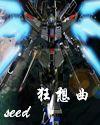alfred tennyson-第18部分
按键盘上方向键 ← 或 → 可快速上下翻页,按键盘上的 Enter 键可回到本书目录页,按键盘上方向键 ↑ 可回到本页顶部!
————未阅读完?加入书签已便下次继续阅读!
To think or say; 'There is the nightingale';
So fared it with Geraint; who thought and said;
'Here; by God's grace; is the one voice for me。'〃
Yniol frankly admits in the tale that he was in the wrong in the
quarrel with his nephew。 The poet; however; gives him the right; as
is natural。 The combat is exactly followed in the Idyll; as is
Geraint's insistence in carrying his bride to Court in her faded
silks。 Geraint; however; leaves Court with Enid; not because of the
scandal about Lancelot; but to do his duty in his own country。 He
becomes indolent and uxorious; and Enid deplores his weakness; and
awakes his suspicions; thus:…
And one morning in the summer time they were upon their couch; and
Geraint lay upon the edge of it。 And Enid was without sleep in the
apartment which had windows of glass。 And the sun shone upon the
couch。 And the clothes had slipped from off his arms and his breast;
and he was asleep。 Then she gazed upon the marvellous beauty of his
appearance; and she said; 〃Alas; and am I the cause that these arms
and this breast have lost their glory and the warlike fame which they
once so richly enjoyed!〃 And as she said this; the tears dropped
from her eyes; and they fell upon his breast。 And the tears she
shed; and the words she had spoken; awoke him; and another thing
contributed to awaken him; and that was the idea that it was not in
thinking of him that she spoke thus; but that it was because she
loved some other man more than him; and that she wished for other
society; and thereupon Geraint was troubled in his mind; and he
called his squire; and when he came to him; 〃Go quickly;〃 said he;
〃and prepare my horse and my arms; and make them ready。 And do thou
arise;〃 said he to Enid; 〃and apparel thyself; and cause thy horse to
be accoutred; and clothe thee in the worst riding…dress that thou
hast in thy possession。 And evil betide me;〃 said he; 〃if thou
returnest here until thou knowest whether I have lost my strength so
completely as thou didst say。 And if it be so; it will then be easy
for thee to seek the society thou didst wish for of him of whom thou
wast thinking。〃 So she arose; and clothed herself in her meanest
garments。 〃I know nothing; Lord;〃 said she; 〃of thy meaning。〃
〃Neither wilt thou know at this time;〃 said he。
〃At last; it chanced that on a summer morn
(They sleeping each by either) the new sun
Beat thro' the blindless casement of the room;
And heated the strong warrior in his dreams;
Who; moving; cast the coverlet aside;
And bared the knotted column of his throat;
The massive square of his heroic breast;
And arms on which the standing muscle sloped;
As slopes a wild brook o'er a little stone;
Running too vehemently to break upon it。
And Enid woke and sat beside the couch;
Admiring him; and thought within herself;
Was ever man so grandly made as he?
Then; like a shadow; past the people's talk
And accusation of uxoriousness
Across her mind; and bowing over him;
Low to her own heart piteously she said:
'O noble breast and all…puissant arms;
Am I the cause; I the poor cause that men
Reproach you; saying all your force is gone?
I AM the cause; because I dare not speak
And tell him what I think and what they say。
And yet I hate that he should linger here;
I cannot love my lord and not his name。
Far liefer had I gird his harness on him;
And ride with him to battle and stand by;
And watch his mightful hand striking great blows
At caitiffs and at wrongers of the world。
Far better were I laid in the dark earth;
Not hearing any more his noble voice;
Not to be folded more in these dear arms;
And darken'd from the high light in his eyes;
Than that my lord thro' me should suffer shame。
Am I so bold; and could I so stand by;
And see my dear lord wounded in the strife;
Or maybe pierced to death before mine eyes;
And yet not dare to tell him what I think;
And how men slur him; saying all his force
Is melted into mere effeminacy?
O me; I fear that I am no true wife。'
Half inwardly; half audibly she spoke;
And the strong passion in her made her weep
True tears upon his broad and naked breast;
And these awoke him; and by great mischance
He heard but fragments of her later words;
And that she fear'd she was not a true wife。
And then he thought; 'In spite of all my care;
For all my pains; poor man; for all my pains;
She is not faithful to me; and I see her
Weeping for some gay knight in Arthur's hall。'
Then tho' he loved and reverenced her too much
To dream she could be guilty of foul act;
Right thro' his manful breast darted the pang
That makes a man; in the sweet face of her
Whom he loves most; lonely and miserable。
At this he hurl'd his huge limbs out of bed;
And shook his drowsy squire awake and cried;
'My charger and her palfrey'; then to her;
'I will ride forth into the wilderness;
For tho' it seems my spurs are yet to win;
I have not fall'n so low as some would wish。
And thou; put on thy worst and meanest dress
And ride with me。' And Enid ask'd; amazed;
'If Enid errs; let Enid learn her fault。'
But he; 'I charge thee; ask not; but obey。'
Then she bethought her of a faded silk;
A faded mantle and a faded veil;
And moving toward a cedarn cabinet;
Wherein she kept them folded reverently
With sprigs of summer laid between the folds;
She took them; and array'd herself therein;
Remembering when first he came on her
Drest in that dress; and how he loved her in it;
And all her foolish fears about the dress;
And all his journey to her; as himself
Had told her; and their coming to the court。〃
Tennyson's
〃Arms on which the standing muscle sloped;
As slopes a wild brook o'er a little stone;
Running too vehemently to break upon it;〃
is suggested perhaps by Theocritus〃The muscles on his brawny arms
stood out like rounded rocks that the winter torrent has rolled and
worn smooth; in the great swirling stream〃 (Idyll xxii。)
The second part of the poem follows the original less closely。 Thus
Limours; in the tale; is not an old suitor of Enid; Edyrn does not
appear to the rescue; certain cruel games; veiled in a magic mist;
occur in the tale; and are omitted by the poet; 〃Gwyffert petit; so
called by the Franks; whom the Cymry call the Little King;〃 in the
tale; is not a character in the Idyll; and; generally; the gross
Celtic exaggerations of Geraint's feats are toned down by Tennyson。
In other respects; as when Geraint eats the mowers' dinner; the tale
supplies the materials。 But it does not dwell tenderly on the
reconciliation。 The tale is more or less in the vein of 〃patient
Grizel;〃 and he who told it is more concerned with the fighting than
with amoris redintegratio; and the sufferings of Enid。 The Idyll is
enriched with many beautiful pictures from nature; such as this:…
〃But at the flash and motion of the man
They vanish'd panic…stricken; like a shoal
Of darting fish; that on a summer morn
Adown the crystal dykes at Camelot
Come slipping o'er their shadows on the sand;
But if a man who stands upon the brink
But lift a shining hand against the sun;
There is not left the twinkle of a fin
Betwixt the cressy islets white in flower;
So; scared but at the motion of the man;
Fled all the boon companions of the Earl;
And left him lying in the public way。〃
In Balin and Balan Tennyson displays great constructive power; and
remarkable skill in moulding the most recalcitrant materials。 Balin
or Balyn; according to Mr Rhys; is the Belinus of Geoffrey of
Monmouth; 〃whose name represents the Celtic divinity described in
Latin as Apollo Belenus or Belinus。〃 {14} In Geoffrey; Belinus;
euphemerised; or reduced from god to hero; has a brother; Brennius;
the Celtic Bran; King of Britain from Caithness to the Humber。
Belinus drives Bran into exile。 〃Thus it is seen that Belinus or
Balyn was; mythologically speaking; the natural enemy〃 (as Apollo
Belinus; the radiant god) 〃of the dark divinity Bran or Balan。〃
If this view be correct; the two brothers answer to the good and bad
principles of myths like that of the Huron Iouskeha the Sun; and
Anatensic the Moon; or rather Taouiscara and Iouskeha; the hostile
brothers; Black and White。 {15} These mythical brethren are; in
Malory; two knights of Northumberland; Balin the wild and Balan。
Their adventures are mixed up with a hostile Lady of the Lake; whom
Balin slays in Arthur's presence; with a sword which none but Balin
can draw from sheath; and with an evil black…faced knight Garlon;
invisible at will; whom Balin slays in the castle of the knight's
brother; King Pellam。 Pursued from room to room by Pellam; Balin
finds himself in a chamber full of relics of Joseph of Arimathea。
There he seizes a spear; the very spear with which the Roman soldier
pierced the side of the Crucified; and wounds Pellam。 The castle
falls in ruins 〃through that dolorous stroke。〃 Pellam becomes the
maimed king; who can only be healed by the Holy Grail。 Apparently
Celtic myths of obscure antiquity have been adapted in France; and
interwoven with fables about Joseph of Arimathea and Christian
mysteries。 It is not possible here to go into the complicated
learning of the subject。 In Malory; Balin; after dealing the
dolorous stroke; borrows a strange shield from a knight; and; thus
accoutred; meets his brother Balan; who does not recognise him。 They
fight; both die and are buried in one tomb; and Galahad later
achieves the adventure of winning Balin's sword。 〃Thus endeth the
tale of Balyn and of Balan; two brethren born in Northumberland; good
knights;〃 says Malory; simply; and unconscious of the strange
mythological medley under the coat armour of romance。
The materials; then; seemed confused and obdurate; but Tennyson works
them into the course of the fatal love of Lancelot and Guinevere; and
into the spiritual texture of the Idylls。 Balin has been expelled
from Court for the wildness that gives him his name; Balin le
Sauvage。 He had buffeted a squire in hall。 He and Balan await all
challengers beside a well。 Arthur encounters and dismounts them。
Balin devotes himself to self…conquest。 Then comes tidings that
Pellam; of old leagued with Lot against Arthur; has taken to




![[abo]我是一个alpha封面](http://www.baxi2.com/cover/16/16925.jpg)
